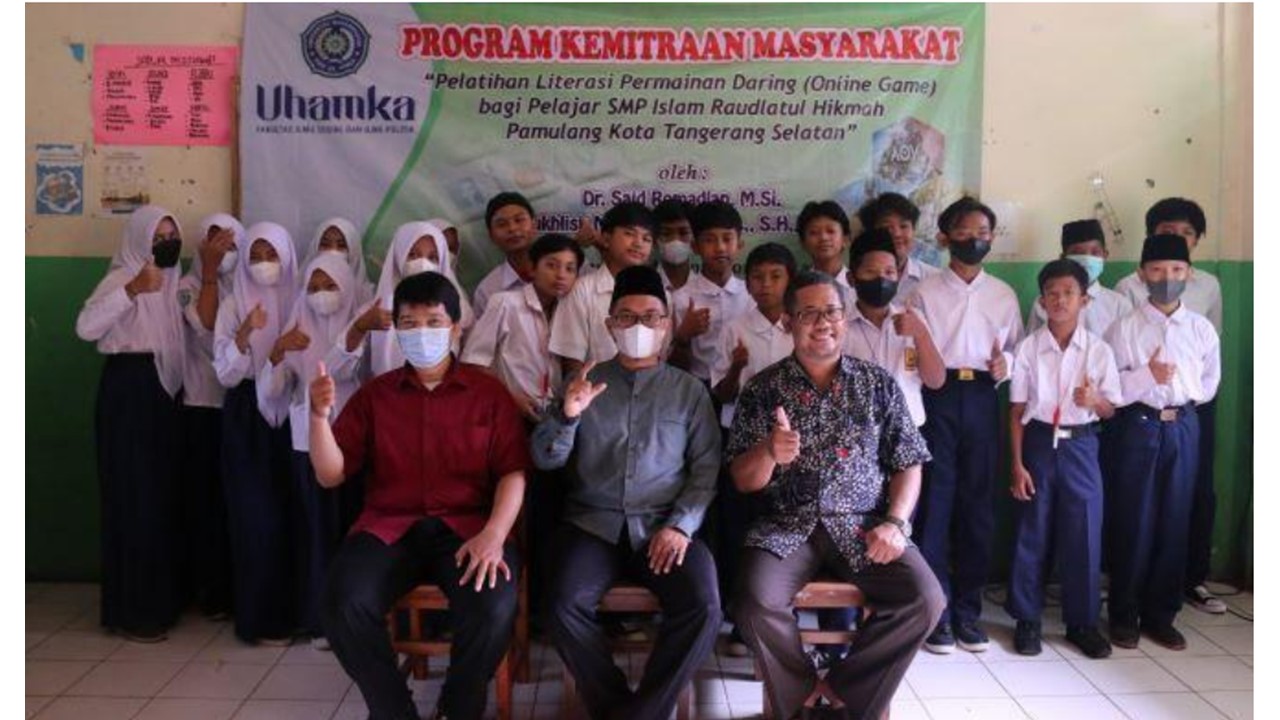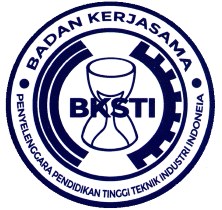Overcoming the Impact of Online Games through Literacy for Junior High School Students in South Tangerang City
DOI:
https://doi.org/10.12928/spekta.v3i1.5741Keywords:
Literacy, Impact of Online Games, Mabar Culture, SMP Islam Raudlatul HikmahAbstract
Background: A form of communication technology widely played today is an online game, which is a type of game that utilizes computer networks. However, this type of game can cause addictive effects in the long run, such as in the case of Islamic Junior High School students Raudlatul Hikmah, thereby leading to decreased learning performance. This research aims to provide online game literacy training, such as the development, characteristics, and forms of online gaming, regulation, ethics, and the effects of online games, and tips on overcoming them.
Contribution: This research contributes to students' understanding of the development characteristics and forms of online games, as well as the regulations, ethics, and their effects, to overcome its negative impacts.
Method: Methods applied include sharing experiences in using online games, presentations and discussions on its literacy, and questionnaire and guided group discussions on online game problems.
Results: The results showed that on the average, 82% of students understand the development, characteristics, and types of online games. Meanwhile, 96% understand its effects, while 85% have adequate knowledge of the tips needed to overcome the associated adverse effects.
Conclusion: In conclusion, the objectives set by this training program can meet the target of providing online game literacy for Islamic Junior High School students Raudlatul Hikmah
References
T. Flew, New Media an Introduction. Victoria: Oxford University Press, 2005.
M. Lister, J. Dovey, S. Giddings, I. Grant, and K. Kelly, New Media a Critical Introduction. London and New York: Routledge, 2009.
M. McLuhan, Understanding Media: The Extensions of Man, 2nd ed. New York: McGraw Hill, 1964.
R. Komalasari, “Manfaat Teknologi Informasi dan Komunikasi di Masa Pandemi Covid-19,” Temat. - J. Teknol. Inf. Dan Komun., vol. 7, no. 1, pp. 38–49, 2020, [Online]. Available: https://www.jurnal.plb.ac.id/index.php/tematik/article/view/369.
U. Hanifah Salsabila, L. Irna Sari, K. Haibati Lathif, A. Puji Lestari, and A. Ayuning, “Peran Teknologi Dalam Pembelajaran Di Masa Pandemi Covid-19,” Al-Mutharahah J. Penelit. dan Kaji. Sos. Keagamaan, vol. 17, no. 2, pp. 188–198, 2020, doi: 10.46781/al-mutharahah.v17i2.138.
A. Latip, “Peran Literasi Teknologi Informasi Dan Komunikasi Pada Pembelajaran Jarak Jauh Di Masa Pandemi Covid-19,” EduTeach J. Edukasi dan Teknol. Pembelajaran, vol. 1, no. 2, pp. 108–116, Jun. 2020, doi: 10.37859/eduteach.v1i2.1956.
M. I. Al Ulil Amri, R. S. Bahtiar, and D. E. Pratiwi, “Dampak Penggunaan Gadget terhadap Kemampuan Interaksi Anak Sekolah Dasar pada Situasi Pandemi Covid-19’,” Trapsila J. Pendidik. Dasar, vol. 2, no. 02, p. 14, Dec. 2020, doi: 10.30742/tpd.v2i2.933.
J. Straubhaar, R. LaRose, and L. Davenport, Media Now Understanding Media, Culture, and Technology. United Kingdom: Wadsworth, 2012.
Kumparan.com, “Game Terpopuler di Indonesia dan Paling Sering Dimainkan di Smartphone,” Kumparan.com, Jun. 28, 2021.
W. Sanditaria, S. Y. R. Fitri, and A. Mardhiyah, “Adiksi Bermain Game Online Pada Anak Usia Sekolah di Warung Internet Penyedia Game Online Jatinagor Sumedang,” Student e-Journal, vol. 1, no. 1, pp. 1–15, 2012.
M. B. Oliver, “Entertainment,” in The Sage Handbook of Media Processes and Effects, R. L. Nabi and M. B. Oliver, Eds. London: Sage Publication, 2009, pp. 161–176.
B. D. Ng and P. Wiemer-Hastings, “Addiction to the Internet and Online Gaming,” CyberPsichology Behav., vol. 8, no. 2, 2005.
A. Arianto and T.- Bahfiarti, “Pemahaman Dampak Game Online pada Anak-Anak Nelayan di Kota Makassar,” Commun. J. Ilmu Komun., vol. 4, no. 2, pp. 165–184, 2020, doi: 10.15575/cjik.v4i2.7999.
E. Novrialdy, “Kecanduan Game Online pada Remaja: Dampak dan Pencegahannya,” Bul. Psikol., vol. 27, no. 2, p. 148, 2019, doi: 10.22146/buletinpsikologi.47402.
J. W. Potter, Media Literacy. Singapore: Sage, 2014.
Y. Iriantara, Literasi Media Apa, Mengapa, Bagaimana. Bandung: Simbiosa, 2009.
A. Zikrillah, A. M. Padiatra, I. Gunawan, B. Setiawan, and M. Z. Muttaqin, “Perspektif Komunikaksi Islam Terhadap Perilaku Kekerasan Verbal Dalam Permainan Daring (Studi Kasus Game Mobile Legends: Bang Bang),” J. Dakwah dan Komun., vol. 6, no. 1, p. 95, 2021, doi: 10.29240/jdk.v6i1.2960.
S. Romadlan and D. Wahdiyati, “Upaya preventif adiksi permainan daring (online game) pada anak usia dini,” Pros. Semin. Nas. Abdimasmu, vol. 2, no. 1, pp. 169–182, 2021, [Online]. Available: https://journal.uhamka.ac.id/index.php/abdimasmu/article/view/6863.
S. W. Adiningtiyas, “Peran Guru dalam Mengatasi Kecanduan Game Online (The role of teacher in overcoming addiction to online games),” J. KOPASTA, vol. 4, no. 1, p. 11, 2017, [Online]. Available: www.journal.unrika.ac.idJurnalKOPASTA.
R. Kriyantono, Teknik Praktis Riset Komunikasi. Jakarta: Prenada Media, 2009.
Eriyanto, Metode Penelitian Komunikasi, 3rd ed. Jakarta: Universitas Terbuka, 2019.
D. Suprapti, S. Apriliya, and A. Nugraha, “Penggunaan Bahasa Gaul Pada Peserta Didik Sekolah Dasar,” PEDADIDAKTIKA J. Ilm. Pendidik. Guru Sekol. Dasar, vol. 8, no. 2, pp. 769–779, 2021, [Online]. Available: https://ejournal.upi.edu/index.php/pedadidaktika/article/view/39247.
T. Y. P. P. S. P. B. I. Adi Iwan Hermawan, Nouval Rumaf, “Analisis Abbrevation Bahasa Game Online Pada Permainan Mobile Legend (Kajian Morfologi),” J. Keilmuan Bahasa, Sastra, dan Pengajarannya, vol. Volume (1), no. 1, pp. 8–18, 2020, [Online]. Available: https://unimuda.e-journal.id/jurnalbahasaindonesia/article/view/550/448.
C. E. Ginting and R. Rahman, “Code-Mixing in Narrative Essay of Fifth Grade Students,” Int. J. Sci. Appl. Sci. Conf. Ser., vol. 3, no. 1, p. 17, Dec. 2019, doi: 10.20961/ijsascs.v3i1.32592.
E. Belinda and A. Sutanto, “Gaming Community Arena,” J. Sains, Teknol. Urban, Perancangan, Arsit., vol. 1, no. 2, p. 1819, Jan. 2020, doi: 10.24912/stupa.v1i2.4535.
N. M. Azmi et al., “Perancangan Media Informasi Berbasis Teknologi Esport Bagi Pemain Game Di Kota Jakarta Designing Esport Technology Based Media Information For Game,” vol. 7, no. 2, pp. 2023–2033, 2020, [Online]. Available: https://openlibrarypublications.telkomuniversity.ac.id/index.php/artdesign/article/view/12779/12502.
A. M. Fahmi and P. Olahraga, “E-Sport Menjadi Salah Satu Cabang Olahraga,” Edukasimu.org, vol. 2, no. 3, pp. 1–9, 2022, [Online]. Available: http://edukasimu.org/index.php/edukasimu/article/view/95/101.

Downloads
Published
How to Cite
Issue
Section
License
Copyright (c) 2022 Said Romadlan, Mukhlis Muhammad Maududi

This work is licensed under a Creative Commons Attribution-ShareAlike 4.0 International License.
Authors who publish with SPEKTA (Jurnal Pengabdian Kepada Masyarakat: Teknologi dan Aplikasi) agree to the following terms:
- Authors retain copyright and grant the journal the right of first publication with the work simultaneously licensed under a Creative Commons Attribution License (CC BY-SA 4.0) that allows others to share the work with an acknowledgment of the work's authorship and initial publication in this journal.
- Authors are able to enter into separate, additional contractual arrangements for the non-exclusive distribution of the journal's published version of the work (e.g., post it to an institutional repository or publish it in a book), with an acknowledgment of its initial publication in this journal.
- Authors are permitted and encouraged to post their work online (e.g., in institutional repositories or on their website) prior to and during the submission process, as it can lead to productive exchanges, as well as earlier and greater citation of published work.

This work is licensed under a Creative Commons Attribution-ShareAlike 4.0 International License.












